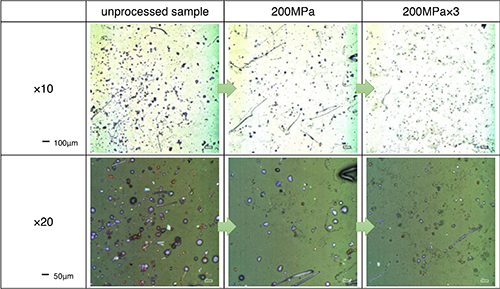Through the discussions with shipbuilding companies, ship owners and vessel engine manufacturers in the development phase of Nano Emulsion Fuel System for large vessel, we became aware of that one of the biggest issues in marine fuel usage is the generation and disposal of sludge which is an inboard waste such as solid materials like oil and rust settled out in the fuel tank etc. and oil-based solid which generates when cleaning up fuel oil, grease and so forth.
Sludge consists of hydrocarbon series materials like wax and asphaltene contained in crude oil and other cracked products. It also includes very hard particle so called FCC (Fluid Catalyst Cracking)catalyst. The silica-alumina-base catalyst particle may cause abnormal wear of fuel injection pump and plunger, or it may results in early galling of piston ring, cylinder, liner and so forth.
Conventionally, the sludge, the volume of which is said to be 1% to nearly 2% of fuel consumption volume, has been finally removed after being dispersed by sludge dispersant, or being dispersed and filtered by homogenizer or purifier. However, we consider that such process itself has become a major issue by increasing fuel cost due to non-effective fuel consumption, energy usage cost and related operation cost as well. To solve such issues, we develop and productize sludge processing unit based on our group’s ultra-atomizing technology and will deploy manufacturing and sales business of related system.
The product to be commercialized is based on unprecedented concept that the system shall cut and disperse the fuel with plenty of sludge sent from oil conditioner to tank, and then, return the fuel to oil supply line as usable marine fuel, the aim of which, in conjunction with Nano Emulsion Fuel System for vessels, is to realize both reduction of NOx and drastic improvement of fuel consumption at the same time along with drastic reduction of operation cost in current sludge handling. The business will provide solution to achieve two objectives at the same time, i.e. to reduce energetic origin CO2 emission by improvement of fuel consumption and by IMO regulation (NOx reduction) for global ship industry, and to reduce non-energetic origin CO2 by reusing and inboard circulating sludge which otherwise were just waste.













